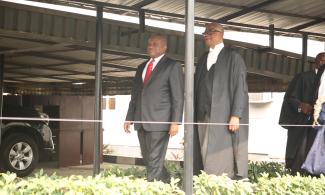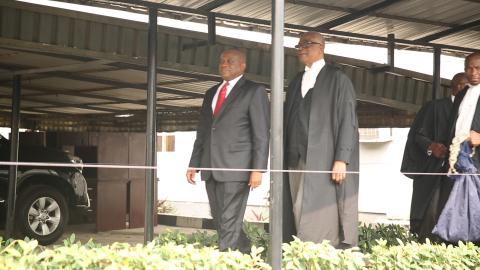
Mr. Ekpelu was summoned by the Economic and Financial Crimes Commission to tender some documents that emanated from his law firm and also give testimony on same
A legal practitioner, Mr. Kingsley Ekpelu, declined to testify as a prosecution witness in the on-going criminal trial of former Abia State Governor, Dr. Orji Uzor Kalu and two others.
The former governor, his commissioner for finance, Ude Udeogo and a company, Slok Nig. Ltd, are facing trial for alleged N3.2 billion fraud.
Mr. Ekpelu was summoned by the Economic and Financial Crimes Commission to tender some documents that emanated from his law firm and also give testimony on same.
The lawyer urged Justice Mohammed Idris of the Federal High Court in Lagos to set aside the summons served on him.

He argued that it would be a breach of his code of practice to testify against his client as that would amount to a divulging confidential information shared between him and his client.
He said: "On Monday evening, a witness' summons was served on me at the behest of the prosecution to come and testify in respect of a document issued from our chambers sometimes in 2004.
“I am urging the court to set aside the summons on the ground that I am not a compellable witness to testify on issues that borders on professional communication between our law firm and the third defendant.
“I am not a compellable witness because it could lead to a breach of professional communication between our law firm and the third defendant.
“I am not permitted by law to testify except and unless the third defendant expressly consent that I should do so.
“If I must testify, there must be a court summon to that effect”.
The lawyer cited Section 192 (1) of the Evidence Act 2011 as well as Rule 19 (1) of the Rules of Professional Conducts for Legal Practitioners 2007 to buttress his points.
Responding, EFCC's lawyer, Mr. Rotimi Jacobs (SAN) said the motion was based on mere apprehension that was not founded in law.
He argued that the lawyer can only raised any objection he has when he was to be put on oath while inside the witness box.
“The basis of the application is mere apprehension not founded in law.
“The lawyer ought to enter the witness box to obey the court's order. It is only when he is to be put on oath that he can raise his objection. It is at this point that we can address the court on whether or not he is a competent and compellable witness
“Administration of Criminal Justice Act does not envisage filing a motion for this. Let him converse his argument and I will respond orally” he said.
Mr. Jacobs noted that apart from the fact that the lawyer has already made statement to the EFCC, the document upon which he is to be examined is already an exhibit before the court.
In his submissions on the issue, Kalu's lawyer, Chief Awana Kalu (SAN), urged the court to consider Sections 185 and 192 (1) of the Evidence Act in granting the motion.
He argued that the EFCC cannot put the lawyer in the witness box because the prosecution witness through which the document was tendered as an exhibit by the commission had informed the court that it was obtained through a search warrant.
The lawyer said he was curious that despite the fact that the document was recovered in the course of investigation by the EFCC since 2004, the commission has not gone to the Code of Conduct Tribunal (CCT) to substantiate its claims that Dr. Kalu was a Director at Slok Nigeria Limited, while serving as Abia State Governor.
“I urged the court not to compel the applicant to testify to prevent the EFCC's ulterior motive of incriminating the first defendant (Dr. Kalu) from becoming a reality", he said.
Other defence lawyers also aligned themselves with the submissions of the senior advocate.
In particular, Slok's lawyer, K. C. Nwofo (SAN), while urging the court to grant the motion said: "Slok has not consented to the lawyer being called to testify in the matter".
The presiding judge adjourned till February 1 for ruling.